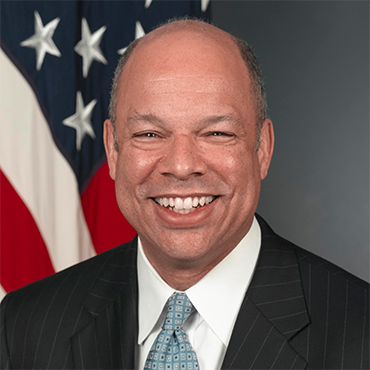DHS chief defends China cyber accord
Homeland Security Secretary Jeh Johnson told lawmakers it was too soon to tell whether a recent cyber accord with Beijing was altering Chinese behavior in cyberspace.

DHS Secretary Jeh Johnson told lawmakers that the public pledge by Chinese President Xi Jinping on cybercrimes was "significant."
Homeland Security Secretary Jeh Johnson told lawmakers on Oct. 21 that it was too soon to tell whether a recent cyber accord with Beijing was altering China’s behavior in cyberspace.
Nonetheless, Johnson told the House Homeland Security Committee the deal is "significant in the sense that [China] publicly, out of the mouth of their president," pledged not to commit cyber-enabled theft of trade secrets.
Rep. Curt Clawson (R-Fla.) wasn't impressed.
"I just wonder why we don't use…the obvious leverage that we have," Clawson told Johnson, adding that if the United States threatened to cut off China’s access to U.S. retail markets, Chinese hacking would stop immediately.
As part of the modest accord, Beijing and Washington agreed to cooperate with requests to investigate cybercrimes and "mitigate malicious cyber activity emanating from their territory," according to a White House summary of the agreement.
James Lewis, a cybersecurity expert and senior fellow at the Center for Strategic and International Studies, generally agreed with Johnson's guarded optimism about the deal.
"The agreement is a good one, but of course it's the follow-up that will count," Lewis told FCW. "If we hold the Chinese accountable, this agreement will work."
Obama administration officials have said the deal is not a panacea but rather a means of measuring China's seriousness on the issue.
Director of National Intelligence James Clapper has called China the leading suspect in the cyber intrusion into Office of Personnel Management records while describing the intrusion as an act of espionage. Beijing has dismissed suggestions of its culpability in the OPM hack as irresponsible.
Clapper faced similar skepticism on the China deal from the Senate Armed Services Committee last month. He told lawmakers then that he was not optimistic the agreement would stop China-sponsored cyberattacks.
The Homeland Security Committee hearing, which covered a range of threats, also featured a lively exchange between FBI Director James Comey and Rep. Will Hurd (R-Texas) over encryption.
Comey has been the face of the Obama administration's appeal to lawmakers to address the possibility of criminals and terrorists "going dark" by using end-to-end encryption on mobile devices. He said recently, and reiterated on Oct. 21, that the administration has dropped its pursuit of legislation to address the issue.
"There's still a perception out there amongst the private sector and privacy groups that the FBI is still looking for a backdoor or a front door to encryption," Hurd, a former CIA officer, told Comey.
Hurd said law enforcement officials could use a mobile device's location to track a suspect without needing to break the encryption. "So saying that you still can't target terrorists that way and throwing certain companies under the bus by saying they're not cooperating, I don't think that's an accurate portrayal of what's really going on," Hurd said to Comey, who denied he was throwing anybody under the proverbial bus.
Hurd also challenged the FBI director to show examples of cases being delayed by encryption, and Comey promised to produce "hundreds and hundreds."
NEXT STORY: OMB preps cyber sprint follow-up





